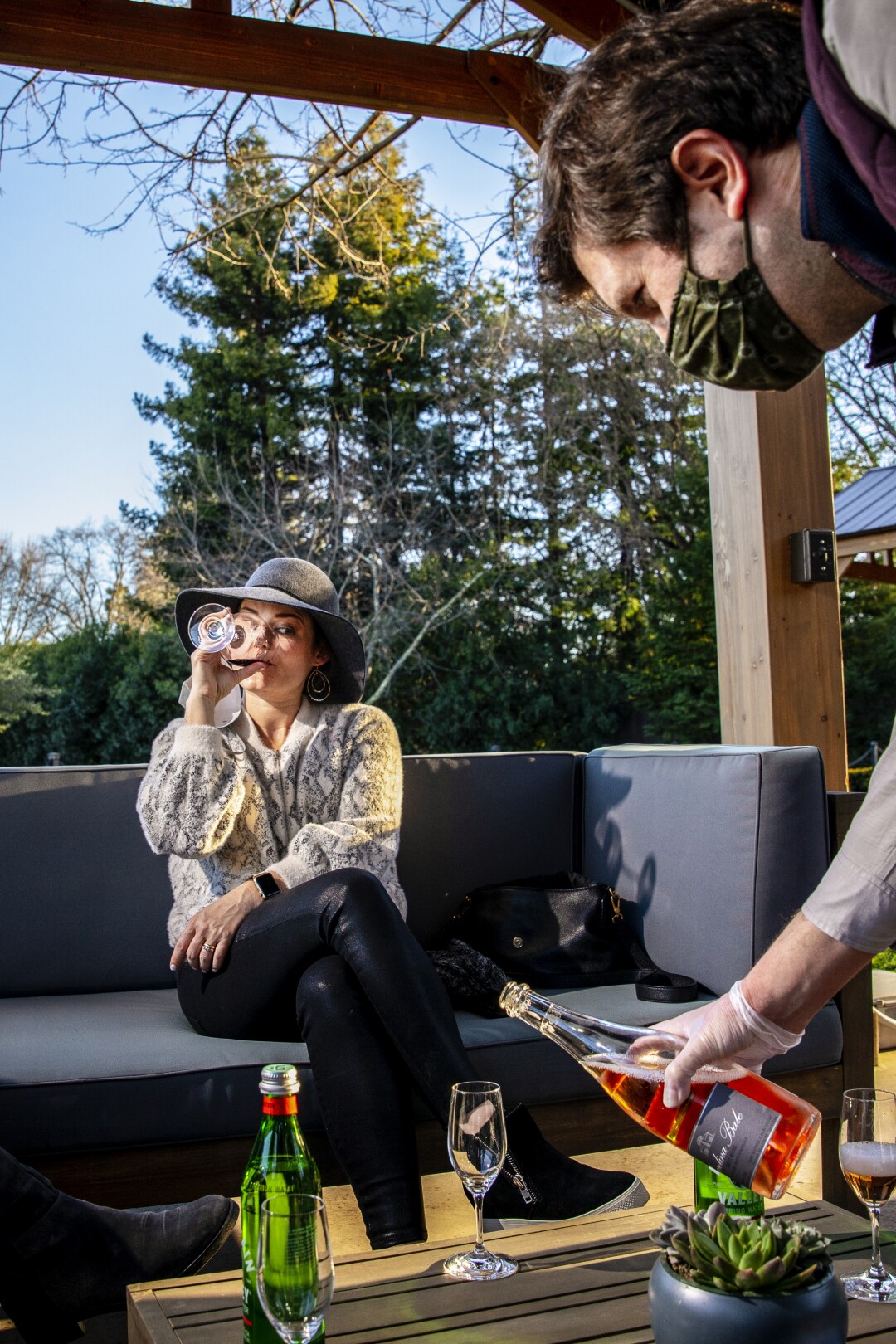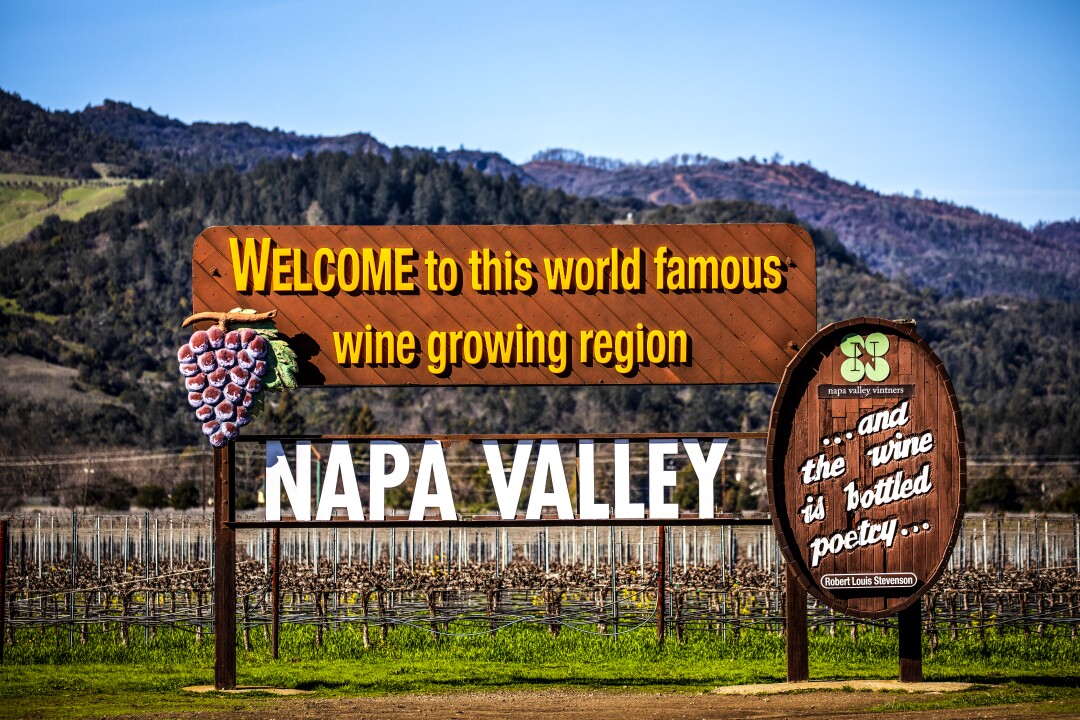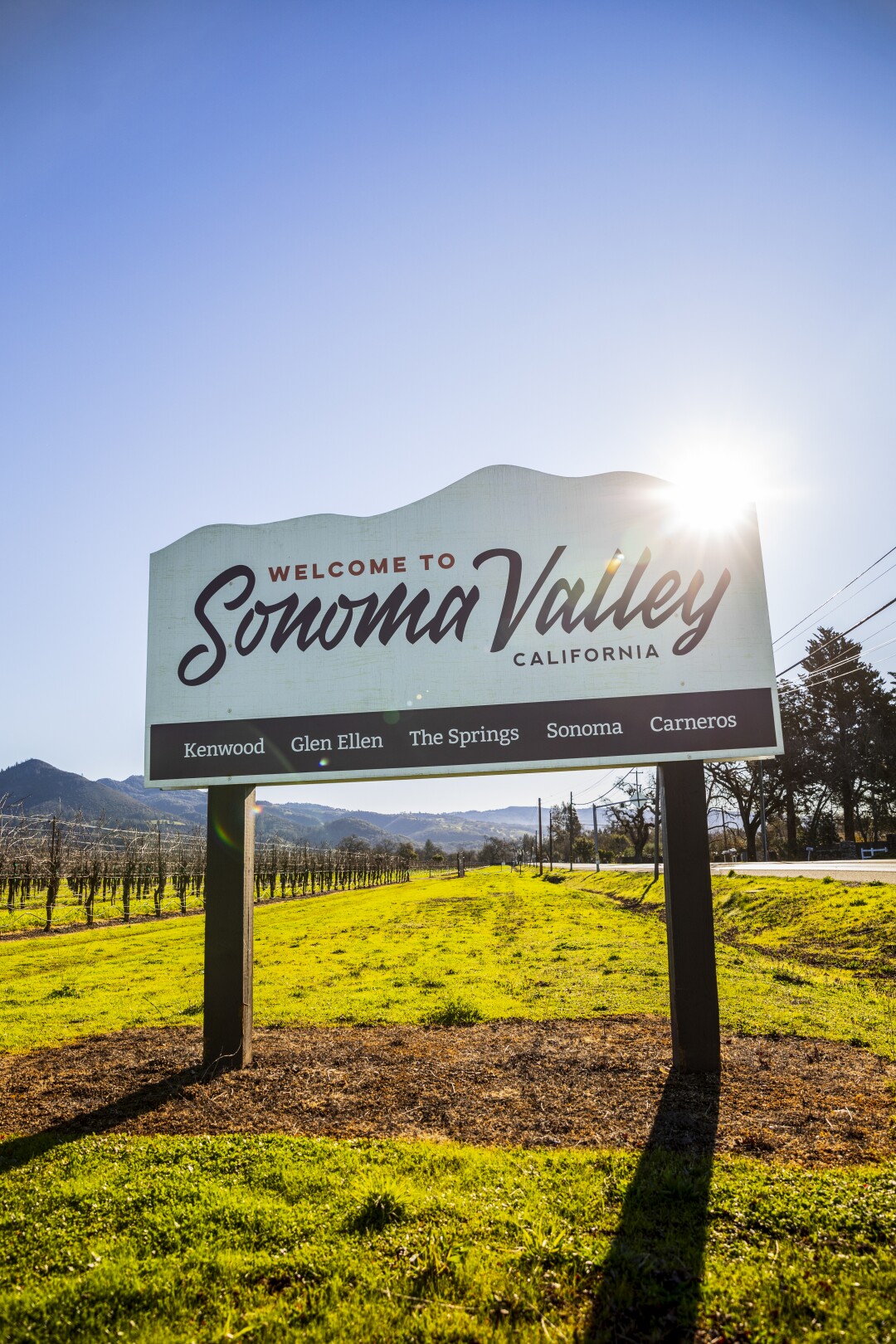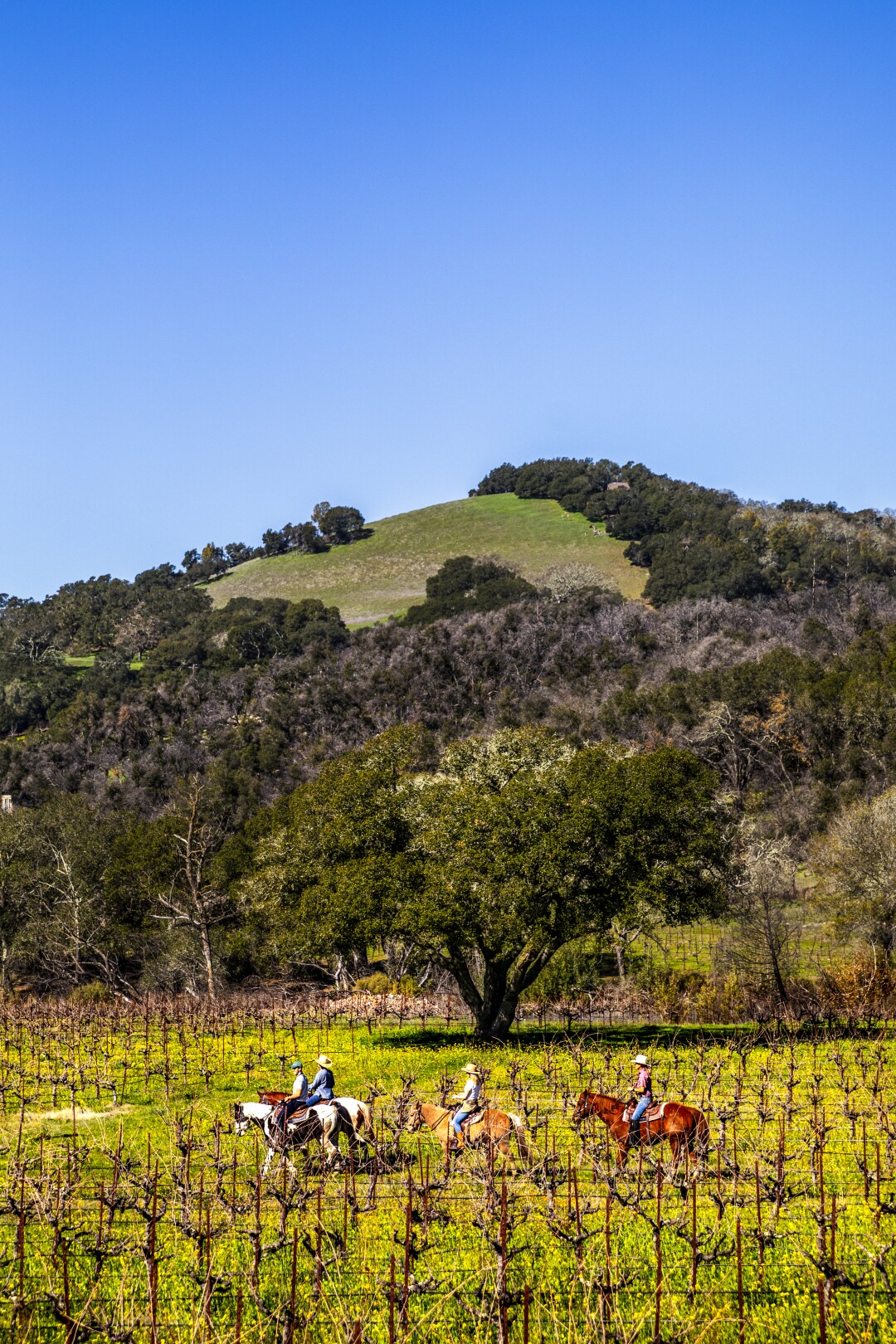If you’re a wine lover, I’ll bet you a bottle of Cabernet Sauvignon that you’ll like some of the changes the last year has wrought in California’s Napa and Sonoma valleys.
That’s not to say the wine industry and its workers haven’t suffered staggering losses from COVID-19 shutdowns and devastating wildfires. Wineries were shuttered for months; experts say vintners will lose billions of dollars statewide. But akin to the advice to make lemonade when life hands you lemons, winemakers have turned sour grapes into fine wine by converting some of the past year’s liabilities into advantages.
They’ve done it by transforming the wine-tasting experience into a series of adventures. Although you might find it more difficult to belly up to a bar in a tasting room — COVID-19 safety guidelines limit the use of indoor spaces — vintners have created lively outdoor activities and added innovative online experiences.
Winery lawns or courtyards have metamorphosed into socially distanced spaces. Unlike many businesses forced to move to parking lots or sidewalks, wineries often have lush grounds at their disposal. Vintners took full advantage, adding cabanas, fire pits and music to bring a party vibe to their tastings.
The region’s towns got into the act too, setting up vibrant mini-parks for alfresco dining and tastings. In Napa, Sonoma, Yountville, Calistoga and St. Helena, visitors find flavorful fun on the sidewalks and back streets where string lights, heaters, tents and festive decorations add spirit to the experience.
Sonoma Valley Trail Rides takes visitors on an excursion through a vineyard at the Bartholomew Estate Winery in Sonoma, Calif.
(Jay L. Clendenin / Los Angeles Times)
Visitors seeking athletic pastimes can mix wine tasting with horseback riding, hiking, cycling or kayaking tours. Feeling lazy? Spend a leisurely afternoon tasting while taking a gondola ride down the Napa River or watching horses graze under the shadow of Mt. St. Helena.
Foodies have lots to choose from. They can visit parklike grounds at a tony Napa Valley vineyard such as Cakebread Cellars or Louis M. Martini and spend $75 or $100 per person for a private party that includes wines and a food pairing. Basic tastings will set them back $30 to $40.
If they’re in the Sonoma Valley — and on a budget — they can buzz over to the expansive mansion and picturesque grounds at Ledson Winery & Vineyards, where they can sit at a picnic table, try a charcuterie-and-cheese plate for $12 and taste five varietals for $30.
Or, if they’re looking for something new, they can check out recently restored Faust Haus, a Prohibition-era Victorian outside St. Helena that offers tastings, starting at $55, on the veranda or in the stunning gardens.
Most wineries also offer virtual tastings, a lucrative business that skyrocketed last year when customers grew tired of being trapped at home. Industry insiders call it “bringing the winery to the people.” In most cases, vintners ship bottles in advance to clients who have arranged video meetings. They can be as small as a solo tasting or large enough to accommodate hundreds of participants.
The tastings have been a silver lining in a period fraught with disappointment.
“The wine industry needed some creativity. We’d been doing the same things for too long,” said Chris Puppione, director of Passalacqua Winery, a small vintner in Healdsburg. “The Zoom tastings allow us to be creative; they allow us to have a dialogue with people, not a monologue.”
Outdoor tastings, of course, require different skills. For the most part, they are hands-off propositions designed to socially distance customers and staff. There are extensive rules about wearing masks and making advance reservations because capacity is limited. Most wineries host tastings only Thursdays through Mondays or in some cases on weekends.
Cakebread Cellars is among those that won’t rush to move its tastings indoors when state safety guidelines ease. “Safety is important — for our guests and our employees,” said Jocelyn Hoar, a Cakebread vice president. “But we’re very fortunate because we have wonderful weather here. People prefer being outdoors.”
Few seem to miss buddying up to servers and other customers in this era of disconnection. In fact, two of Cakebread’s wine club members found a plus in the safety regulations. John and Irene Brunow love the outdoor tasting experience.
“Even with all the safety precautions required because of the pandemic, we felt welcome, safe and appreciated,” said Irene. “Since the number of guests at any one time was limited, we got to spend more one-on-one time with our wine club hosts.”
Of course, the pandemic wasn’t the only cataclysm to befall the region’s winemakers during the last year. Massive wildfires, heavy smoke and 100-degree-plus summer days also took a toll.
The LNU Lightning Complex wildfire, one of the biggest in state history, ignited in August, burning 368,000 acres. In late September, the Glass fire broke out, destroying another 67,000 acres, along with hundreds of homes in Napa and Sonoma counties. Dozens of wineries were damaged. Then the pandemic caused more shutdowns in December and January.
Caitlin Farrell of Chicago does a tasting at the Charles Krug Winery in St. Helena, Calif.
(Jay L. Clendenin / Los Angeles Times)
“The last year has been challenging,” said Jim Morris, a vice president at Charles Krug, the oldest winery in Napa Valley.
“I’m still waiting for plagues of frogs and locusts,” he said. “We’ve had everything else.”
Krug, owned and operated by the Mondavi family for four generations, is rocking its tastings with cabanas, cushy furniture and fire pits.
“We were lucky,” said Morris. “We were just finishing the cabanas when we had to shut down a year ago, so we were ready to go when outdoor tasting was allowed.” Since then, the Charles Krug staff has learned to roll with the punches. “We’re discovering new levels of hospitality, including making it possible for people to have a great wine experience outside even when it’s freezing or raining.”
The goal is to offer a high-end diversion, complete with Wi-Fi in the cabanas. “It’s a premium experience,” Morris said. Krug’s least expensive tasting is $45; a premium experience is $400. But the fee is waived if you spend $400 on wine.
Krug, like many other wineries, has needed to devote more time and effort to virtual tastings. Among Morris’ recent successes was holding a historical wine experience course for a Harvard University club.
“There are so many virtual events going that I needed to hire two workers just to manage them,” he said. During a pandemic — with economic havoc everywhere — that’s a step in the right direction.
The online experience
Most winemakers are struggling. The best way to help? Drink their wines.
Visiting is a good idea too, if you don’t mind traveling. The Napa-Sonoma area is known for its spring temperatures — think warm days, cool nights and blue skies.
But wine lovers who don’t want to make the trip in person can still tap into the excitement of the region through virtual tastings.
It’s easy to arrange one. Just check the website of your favorite winery and make a call. Or check the events listings for Visit Napa Valley or Sonoma Valley
Even wineries that haven’t yet listed virtual events on their websites are getting into the act. You can hold a solo tasting or gather a group of friends. One winery recently hosted 230 people on a corporate Zoom tasting.
Most have several topics available or will personalize the event to your tastes. Zoom-style events are the most popular, but Instagram and Facebook Live events also can be found.
When you register for an event, the winery usually ships bottles for the tasting. Some are full size, others are small. “We send three small bottles. It gets too complicated if people try to open too many when they’re sitting in front of a computer screen,” said Chris Puppione of Passalacqua Winery in Healdsburg.
With nearly 1,000 wineries in the area — each with its own style, setting and history — there’s bound to be a virtual tasting with your name on it.
Low-cost tastings
There was a time, as recently as 20 years ago, when wine tasting in Napa and Sonoma valleys was free.
Today you can spend $400 or more for elaborate tastings that include wine and food pairings.
But if you want to do Napa on the cheap, one winery that offers free tastings is St. Helena’s Sutter Home. Your outdoor tasting here will introduce you to the vintner’s Victorian mansion, rose gardens, vineyard views and philosophy: “A great product for a great price.”
There are also several wineries that charge as little as $15 or $20 for tastings — a good deal considering that you can sample several wines. Many wineries will waive the fee for a tasting flight if you buy wine.
Other tips: Wineries are open only Thursday through Monday; some only on weekends. You’ll need to wear a mask when not seated at a table. And make reservations in advance. Check to make sure children or pets are allowed. For more advice, go to the Napa Valley Visitor Center and the Sonoma Valley Visitors Bureau.
A welcome sign greets visitors along St. Helena Highway in the Napa Valley.
(Jay L. Clendenin / Los Angeles Times)
In Napa Valley, try:
Jessup Cellars: This Yountville winery couples an art gallery with its tasting bar. A flight of three wines is $20; a flight of six is $40. The fees are waived if you buy two or more bottles of wine.
Beringer: There’s lots of history at this venerable Napa Valley winery, which dates to 1876. Enjoy a glass of wine for $15 as you wander through the beautiful gardens. A flight of four wines is $35, when you’re seated at your table.
Rombauer Vineyards: You have two outdoor tasting areas to choose from at Rombauer, which has facilities in both the Napa Valley (St. Helena) and Sierra foothills. A $20 flight is available at St. Helena.
Bennett Lane: Head to the northern Napa Valley, at the edge of the Mayacamas Mountains, to visit this Calistoga-area winery. You’ll sit on the garden patio, where you’ll taste four wines for $25.
Traveling to Sonoma Valley? Try these:
A welcome sign outside Sonoma, Calif.
(Jay L. Clendenin / Los Angeles Times)
Cline Family Cellars: This lovely winery, founded by Fred Cline in the 1980s, wins our award for best deal because you’ll be able to taste five wines in the garden for $15. Cline Vineyards is known for its focus on sustainable farming practices.
Jacuzzi Family Vineyards: You’ll think you’ve just arrived in Tuscany when you visit this 18,000-square-foot property that resembles the family’s ancestral home in Italy. Taste a flight of five wines, accompanied by fresh bread and olive oil, for $20. Purchase two bottles and fees are waived.
Troika Wines: Troika, started by three friends in 2015, hasn’t been around long but its tasting is interesting. For $30 , you’ll sample the winery’s Sauvignon Blancs and rosés.
Loxton Wines: Check out the crush during a tour, which will give you a glimpse of the production process. Tastings take place in a scenic picnic area and include wines from nearby vines. It’s $20 for a flight.
What else can I do?
Andrew Keiser, wrangler Chris Fife, Jessica Seitz and Sonoma Valley Trail Rides owner Michelle Rogers ride through the Bartholomew Estate Winery in Sonoma.
(Jay L. Clendenin / Los Angeles Times)
If you’re looking for adventure with your wine, the Napa and Sonoma valleys are an ideal place to find it. Among the socially distant activities that can be coupled with wine tasting are:
Horseback riding: Bartholomew Estate, a new Sonoma Valley winery, offers horseback riding and hiking on a trail that winds through mature oaks, redwoods and vineyards. Or contact Sonoma Valley Trail Rides for riding info; the group also offers wine-tasting rides at Sonoma’s Alta Vista Vineyards.
Hiking: Active Wine Adventures (activewineadventures.com) is among the local groups that organize wine-tasting hikes through the mountains or vineyards of Napa and Sonoma. Cuvaison wines usually sponsors hikes during the summer.
Cycling and kayaking: Full-day and shorter trips can be arranged with Getaway Adventures.
Gondola ride: Napa Valley Gondola will set a ride for you on the Napa River.
Or you can watch horses graze under the shadow of Mt. St. Helena while tasting wine outdoors at Tamber Bey Winery in Calistoga.










